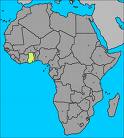Before I begin, I wanted to say that internet connection here in Ghana is very intermittent, and has been a frustrating experience in terms of trying to check my email or write this blog. So please be patient, and between posts, you can always write me!
Incentives, Pay and Brain Drain in the Health Care System.
During my data collection rounds the other day, I happened to take a break in the nurse’s lounge with my translator Auntie Lydia and the head nurse for the labor ward, Auntie Mercy (we call everyone here auntie, uncle, sister etc). Auntie Lydia is one of our two translators, and is currently on leave from the labor ward here as a nurse-midwife. Auntie Mary, our other translator, just recently retired from her position here as head nurse-midwife of the antenatal ward. However, both of them have been working here on and off to help with the shortage of nurse midwives. As we sat, Auntie Lydia and I listened to Auntie Mercy tell of her difficulties in desperately trying to hire two more full-time midwives for the delivery ward.
Currently, Komfo Anokye Teaching Hospital (KATH, where we work) is experiencing extreme shortages of staff, most notably among the nurse-midwives, who contribute far more throughout the maternal wards than the doctors. Many of the nurse-midwives have been taking double shifts to assist their coworkers when short of staff.
Many of the newly-trained nurse-midwives being trained here leave immediately for district hospitals because the work load is lighter and the work incentives are better (KATH is famous for overworking and underpaying its staff). Lydia and Mercy talk about this new generation of nurses as being more concerned about making money and less about caring for their fellow Ghanaian sisters than the older generation of nurse-midwives. Lydia and Mercy refer to these younger nurses as the “computer generation” – one trained for money and new technology, and less for quality patient care. They explain that the older generation of nurse-midwives are very close friends, and so are willing to work double shifts to help each other when they are overburdened.
In the past, nurse-midwives (okay, I’m shortening them to NM, this is getting tiring) were trained solely in the maternity ward. Today, NM-in-training spend three years doing rounds that include other departments in the hospital, including oncology, pediatrics, and even psychology. Mercy and Lydia think it is beneficial to have a more well-rounded NM, unfortunately it also means having to wait longer for potential new workers.
Where as KATH doesn’t provide any work incentives such as reimbursement for the cost of transportation or providing free meals, district hospitals usually do – accounting for the majority of new NMs wanting to work there. While both are government run, District hospitals have much more financial discretion because they employ so few workers, and are therefore able to provide meals and money for transportation, as well as a yearly bonus. For instance, according to Mercy, last year one of the nearby district hospitals gave each worker a bonus of 35 cedi, while here at KATH each received just 8 cedi (one cedi is approx. $1.01).
Brain drain to other African countries, especially South Africa, is extensive. However, with the recent riots in S. Africa over international workers and the deaths of 7 Ghanaians and the burning and pillaging of many of their shops, Mercy and Lydia, are hopeful their Ghanaian workers will return. They note that Ghana is a stable, peaceful country relative to other African countries, and they can’t understand why their fellow Ghanaians leave to work elsewhere- even if the pay is better. They believe that Ghanaians can plan out and budget their earnings and should live according to their means and not what fancy accessories they see others having.
“Occupational Hazards”: Putting oneself in danger to help others.
As Kumasi expands, many nurses are living farther away from KATH – some as much as 40 km away. And for these women, many of them must walk 1-2 km from their homes to the nearest tro-tro stop (Ghana’s form of public transportation - small mini vans that pack in 20 people). If they work in the morning at 7am, they must leave up to 3 hours ahead of time, and add an hour if it is raining.
These long distances and the transportation hubs involved put these women at a much greater risk of being attacked, and such dangers are considered “occupational hazards” by Lydia and Mercy. The attacks usually involve robbing for phones (which use SIM cards and so are easy to immediately sell off) and money, but have become increasingly violent to include rape and murder. Two days ago, the TV reported on a pregnant nurse-midwife who was returning home at night from her shift at the main teaching hospital in Accra when she was attacked with a machete while waiting for the tro-tro, killing her and her unborn child.
Mercy and Lydia argue that in the old days, it was the district hospitals in and near the mining towns that were the most dangerous to work at. Now, they assert that all hospitals are somewhat dangerous to work at, including KATH. They believe this change began in 1983 when the Nigerian government decided they were too many foreign workers, and deported them all (including 10 million Ghanaians of every profession) back to their home countries. This massive influx of returning Ghanaians fostered high unemployment, housing crunches, and massive burdens on the health care system, all of which led to an increase in violent crime.
Since 2001, KATH has been transporting a number of its staff on new hospital-owned buses. This has reduced the chance of these workers being attacked. However, there are not enough of these buses for all of the staff, and they do not run during the night, when many of the doctors and nurse midwives begin or end their shifts. Mercy and Lydia argue that providing more buses for transport along with providing accommodation close to the hospital for doctors, nurses and their families would greatly reduce attacks and would increase the retention of workers, ultimately reducing brain drain.











